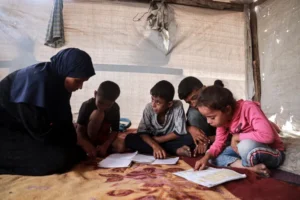Where does the Palestinian cause stand after two years of Israel’s genocide in Gaza?

Jihan Abu Mandeel tries to provide her children with some basic school lessons in their tent in Deir el-Balah
Issam Rimawi writes in The New Arab on 6 October 2025:
As the war on Gaza enters its third year, Israel killed at least 70 Palestinians over the weekend, adding to a death toll that stands at around 67,000 lives, but which, in reality, is likely several times higher. Most of the dead this weekend were in famine-struck Gaza City, where the army has pressed a renewed offensive, pushing residents further south and targeting a displacement camp in Al-Mawasi – a designated “safe” zone.
The grim toll underscores how the two-year mark of Israel’s war, labelled a genocide by the UN, is arriving amid intensifying military operations, deepening humanitarian collapse, and high-stakes diplomacy.
The 20-point peace plan announced by US President Donald Trump last week is the most significant diplomatic initiative so far to end the war, but much uncertainty remains. Israel says it supports the framework, but had insisted on last-minute amendments, while Hamas has signalled a conditional “yes” to some provisions and “negotiations” on others.
Two years of war: A relentless cost in lives
Palestinian analysts across the political spectrum agree that Hamas’s 7 October attack was a pivotal moment that shattered assumptions and exposed the fragility of an international and regional order that had sought to push the Palestinian question to the margins.
**** ****
The Palestinian cause: From marginalisation to renewed centrality
Suleiman Bsharat, director of Yabous for Consulting and Strategic Studies, insists the war’s ferocity was not a mechanical reaction to Hamas’s attack but part of a longer pattern.
“What happened in terms of killing, destruction, and genocide was inevitable because Israel has been killing and destroying since the beginning of the occupation in 1948, and the Palestinian people have been paying the political price with their blood and land,” says Bsharat. “Before 7 October, Netanyahu stood at the United Nations to announce his map, excluding and sidelining the Palestinian issue,” adds Bsharat, emphasising that Israel has been advancing the marginalisation of Palestinian rights for many years.
Hamas’s attack, he says, returned the Palestinian question to the top of the Arab, Islamic, regional, and international agenda. “The slew of international recognitions at the UNGA could not have been achieved diplomatically if it weren’t for the sacrifices and resilience of the Palestinian people, which forced the world to act. This recognition is an important achievement,” he adds.
Today, he continues, there is a transformation in Western capitals, universities, and cultural forces worldwide away from blindly supporting Israel to gradually isolating it. “This has never happened before, but today it is happening in the context of genocide.”
